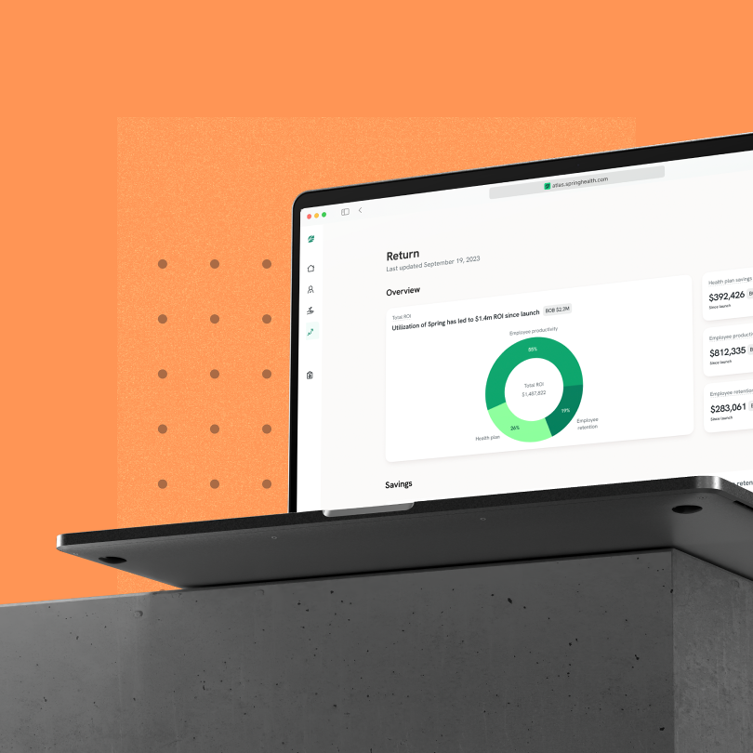Jump to section
There’s no doubt about it—employees are experiencing unprecedented levels of stress. And this stress is affecting productivity, engagement, turnover, and mental health.
For employees to be their best at work and at home, they need direct access to a range of care options. That's why Spring Health offers both therapy and coaching.
Read on to discover the difference between the two solutions, and how coaching can help you develop a healthier workforce through positive change.
What is coaching?
Coaching is evidenced-based and leads to improvements that help a person’s personal and professional wellbeing.
It’s focused on taking action, and helps employees create the forward movement they need to make personal changes that are practical and sustainable. The coach helps employees define and clarify their goals, create an achievable action plan, and keep them accountable.
With the support of a Spring Health coach, employees can gain clarity and the confidence to take action, improve their skills, build resilience, and unlock and optimize their full potential.
The difference between therapy and coaching
It’s important to note that therapy and coaching are two separate fields.
Therapy focuses on diagnosis and treatment. It can help employees process how or why something happened, so they can move forward.
Therapists are qualified to treat psychological problems and disorders—like depression, anxiety, suicidal intent, OCD, or Bipolar disorder. They can also help uncover the beliefs that are causing problematic behavior, relationship issues, and self-destructive habits.
Even if someone doesn’t have a mental health condition, therapy can heal emotional pain.
Coaching is forward-looking and action-oriented, focused on gaining clarity and identifying blockers like limiting beliefs and negative thought patterns.
Coaches recognize that the employee is the expert of their own life. A coach’s job is to ask the right questions and help employees get out of their own way, so they can find the solutions that are right for them.
Not everyone needs a coach, and not everyone needs a therapist. In some cases, people need both.
Getting started with coaching
Spring Health uses a data-driven, personalized approach to ensure every employee gets the right support.
Each employee’s mental health journey begins with a short, clinically-validated assessment that generates a personalized care plan. The assessment is an extremely important part of the process. Working with a coach before unpacking trauma and deeper issues in therapy can lead to more harm than good.
If coaching is included in the plan, employee’s find their own coach through the Spring Health platform, or work with their Care Navigator, who is a licensed clinician, to find the best coach for them.
Coaching credentials and specialities
Spring Health Coaches undergo the same rigorous vetting process as our Provider network to ensure our expanding team maintains a standard of excellence. All our coaches are certified by the International Coaching Federation (ICF) or The National Board for Health & Wellness Coaching (NBHWC), and have completed over 100 hours of coaching.
Spring Health coaches specialize in a range of topics related to health and wellness, personal development, and parenting for both employees and their dependents over 18 years old.
Coaches adhere to the same ethical framework for in-person and virtual coaching, and empower employees to take control of their busy lives.
Different coaching modalities
All Spring Health coaches are trained and highly experienced in multiple modalities, including Motivational Interviewing (MI), which is a collaborative and person-first communication style.
Coaches don’t tell employees what to do. They adhere to the employee’s agenda, focusing on what the employee wants to accomplish through active and reflective listening, compassion, and empathy.
Besides MI, many of our coaches have additional training and certifications in neuro-linguistic programming (NLP), emotional intelligence, somatic coaching, positive psychology, and non-violent communication.
Neuro-linguistic programming (NLP)
NLP focuses on the relationship between subjective experiences such as language, thought, emotion, and behavior. This means that a coach takes everything into consideration—nonverbal cues, verbal information, and what might be behind someone’s words, too.
Many people struggle with articulating their goals and/or challenges. Having a coach decipher unspoken thoughts allows each employee to feel heard and understood.
Emotional intelligence (EQ)
Spring Health Coaches have high EQ—the ability to perceive, control, evaluate, understand, use, and manage their own emotions in positive ways.
They’re trained to put their own feelings, emotions, triggers, and even judgment aside so they can be fully present and fully support their client.
Most importantly, coaches have the skills to teach and inspire employees to manage their emotions in positive ways, as well.
Somatic coaching
Somatic coaching takes into consideration a person’s neurology, psychology, and biology, and focuses on principles such as body awareness and mindfulness.
Coaches help members explore and draw connections to where they feel different emotions in their bodies. This modality is great for things like relieving stress, improving sleep, or addressing overwhelm and burnout.
Positive psychology
This is the study of strengths, assets, and positive attributes—and it’s the foundation for coaching. By focusing on an employee’s strengths, assets, and positive attributes, coaches help people build self-efficacy, feel more motivated and inspired, perform better at work, and achieve greater success both personally and professionally.
Non-violent communication
Non-violent communication is the language of compassion. It’s designed to increase empathy and allows employees to feel heard and respected. This communication style helps build rapport and allows employees to feel comfortable enough to open up about their personal and professional challenges.
Vocalizing compassion and increasing empathy with an employee allows them to feel more comfortable around setting goals, especially with sensitive topics such as anxiety, confidence, and/or parenting.
Meeting each employee right where they are
Coaches use all these skills and modalities to meet employees exactly where they are, no matter what their communication, literacy, and acuity levels. This might look like identifying their strengths, changing their thoughts and beliefs, or better managing their emotions.
Using skills like motivational interviewing, NLP, and emotional intelligence, coaches ensure that each employee they work with feels heard, respected, motivated and inspired.
How coaching can benefit your organization
Coaching helps employees create healthier, more sustainable, and less costly behaviors that drive improvements while also benefiting your bottom line.
According to the ICF’s Global Coaching Study, after working with a coach:
- 80% of respondents improved their self-confidence
- 73% saw their relationships improve
- 72% improved their communication skills
- 67% improved their work-life balance
Since we launched our coaching solution in 2021, we continue to get positive feedback from employees, like this:
“[My Coach] is so insightful and is able to really understand the true nature of what I'm trying to say, even when I have a hard time verbalizing and/or understanding what I really mean. This makes me feel incredibly more focused and satisfied about my life, career, and work. I look forward to many more sessions.”
This quote exemplifies how offering coaching to your employees can normalize the conversation around mental health, and ensure everyone within your organization is getting the kind of help they need.
Get your copy of our latest coaching white paper where we explore coaching versus therapy, impactful coaching specialties, existing limitations, and key factors for selecting a coaching solution.
About the Author

Annie Delre is a Certified Integrative Wellness Coach who specializes in stress management techniques, the mind-body connection, communication, self-care and self-esteem. She is a Life & Success, Emotional Freedom Technique, Neuro-Linguistic Programming (NLP), Time Technique, and Clinical Hypnotherapy practitioner. Annie also has a graduate degree in Integrative Wellness Coaching.





.png)




.png)
.jpg)
.png)








